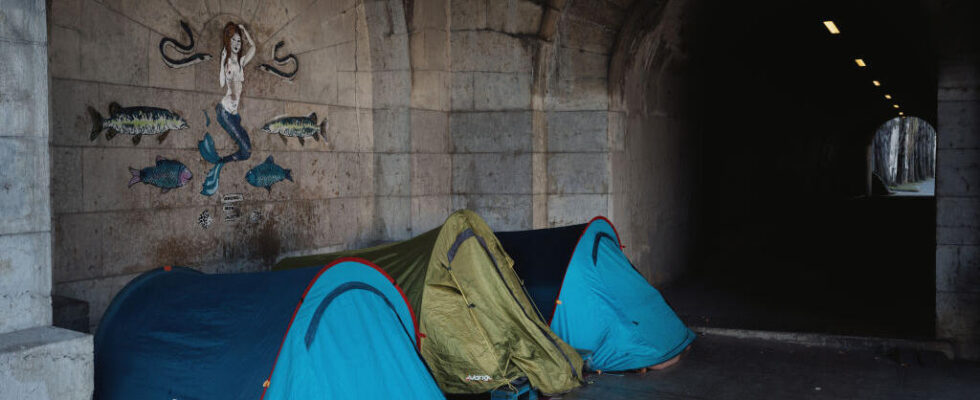The La Cloche association and the Abbé Pierre Foundation fear a desire, with the Olympic Games approaching, to drive homeless people out of city centers.
Near the Louvre Museum in Paris, the window sills where Mike, 26, placed his sleeping bag at night were covered with metal spikes overnight. “ It was a sheltered space, there were surveillance cameras and a feeling of security », explains the young man who had gotten into the habit of sleeping in this very touristy district, one of the capital’s showcases. Since 2023, more and more corners like this one have been adorned with exclusionary urban features. “ Now, I sometimes move around for 1.5-2 hours to find a place to sleep, whereas before, it took me 10 minutes “, he laments.
The installation of anti-homeless furniture is not new. “ We didn’t wait for the Olympics to do disgusting things in this countrysays Manuel Domergue, director of studies at the Abbé Pierre Foundation. It existed before Paris 2024, it will still exist after. But in recent years, these measures have been on the increase and are reinforced as the tourist seasons or mega-events approach. “.
The most obvious example is under the Charles de Gaulle bridge, which connects the Gare de Lyon and the Gare d’Austerlitz, strategic areas of the capital. On the quays below, dozens of homeless people’s tents found themselves replaced overnight by dozens of rocks and metal grills. The objective: to avoid relocation of the camp, seven months before the opening ceremony of the Games which will partly take place there.
Benches suddenly flanked by armrests right in the middle of the seat, huge flower pots without flowers, railings that surround an empty space, posts that grow in the sheltered recesses of shops. The inventiveness of certain urban developments is so surprising that the Abbé Pierre Foundation will cynically reward the best anti-homeless device in November 2024 during the Pics d’or ceremony.
Read alsoAhead of the Olympic Games in Paris, expulsions increased by “almost 40%”, denounces a collective
The actors who organize urban exclusion
In 2020, Paris City Hall committed to no longer installing this type of exclusionary furniture and had one of the devices publicized at the time by Christian Page, who calls himself “SDF 2.0” on the networks, uninstalled. : a metro air vent surrounded by mesh, preventing homeless people from lying down there to get some warm air in winter.
But the city must go even further. “ We want it to get involved with other players, public or private, who continue to install this type of furniture. Shops, condominiums, major brands “, explains Manuel Domergue. A multitude of private actors who have an economic interest at the time of the 2024 Olympics.
The foundation is particularly vigilant towards companies that own bus shelters or seats on public transport,” where benches are removed in favor of individual and spaced seats, sitting-standing, or sometimes nothing at alllists the researcher, making the city inhospitable to all audiences, including people with disabilities, pregnant women, the elderly or children “.
Mike paid the price too. “ Before, I could lie down in the subway, sleep warm. But the benches have been systematically replaced for several years by chairs and it is impossible to sleep there. “. Today, it lands at Orly Airport at the end of the day, 20 km south of Paris. “ The security guards leave us alone, and if we have a problem, we know we can contact them “, he says. “ But they have already warned us that this summer, with the arrival of tourists for the Olympics, it will be complicated to come here “.
Where to go, when the streets have become inhospitable? Mike has no idea yet, but staying in Paris seems impossible to him. “The town hall agents have already warned us that we were going to have to clear out. They told us that if we stayed, they would fine us. I told them ‘Go ahead, fine me if you want, I won’t be able to pay your fine anyway!’ “, he quips.
Read alsoWill the Olympics constitute a social regression?
The decree, future administrative weapon of the Olympic Games?
In April 2024, the town hall of Amiens, prefecture of Picardy, north of Paris, banned people on the street from begging in certain districts of the city, in anticipation of the Olympic Games, while the city does not welcomes no test. “ We see that the Olympics have a broad backcomments Manuel Domergue of the Abbé Pierre Foundation. The mayor issued this decree out of fear that homeless Parisians, encouraged to leave the capital, would end up en masse at her home. The municipal decision did not last long. Several associations, including the Human Rights League, managed to have it suspended by the administrative court a few weeks later. But the municipal or prefectural decree remains a preferred tool of the public authorities to evict undesirable people from city centers. “ Every summer, there are cities that know how to issue very well-written decrees, limited in time and space. This is particularly the case of the city of Nice, champion of inhospitality “.
As the Olympic Games approach, an event that is not a trigger, but an accelerator of urban exclusion, the La Cloche association, which creates social ties between homeless people and local residents, is launching a poster campaign to warn of exclusionary furniture. , so that France keeps its promise to organize inclusive and virtuous Olympic Games. Residents, transport users and visitors are called upon to denounce anti-homeless measures on social networks using the hashtag #StopMobilierExcludant or on the Golden Peaks platform to complete the already existing mapping.
Read also2024 Olympics: with more than 12,500 people expelled, associations denounce “social cleansing”
